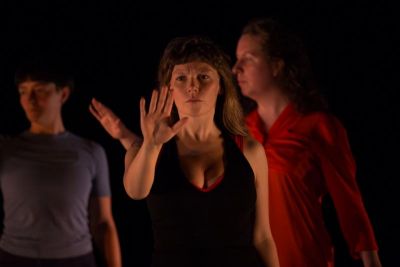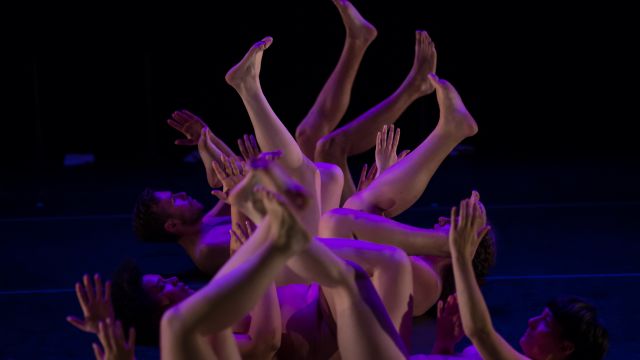Trilogy
Eleven years ago, Nic Green was working in UK schools with 12-year-olds. A majority of girls, imagining their future, said their dream was to be ‘a footballer’s wife’. At the same time, as she says in her program note, Nic Green was making a performance piece with other young girls - girls as young as eight, ‘lost in a fog of self-deprecating negativity…[concerned] about their own bodies and the self-doubt they lived with daily…’
These depressing observations were the catalyst and genesis for what has become Trilogy – a full-blown, agit-prop performance piece in – obviously – three parts. If the initial stimulus suggests a long and dour evening of anger and despair, it turns out that anger is a controlled but driving subtext and the despair is defeated by a bright, cheerful, defiant and undefeated resilience. Trilogy is a joyous show.
Nic Green and Laura Bradshaw (who happens to be gloriously, visibly pregnant) are immediately engaging and warm, there’s a twinkle in their eyes and they are, dare I say it, loveable. They also spend about half the show completely naked. The initial novelty – or shock, for some - wears off in about five seconds. Then they are women who happen to be naked as they talk to us and dance together. Their dancing is intricate, graceful and controlled. It is also a revelation to see dancing bodies that do not confirm to the ’ballerina’ stereotype. Or you might be reminded that were these women of Rubens’ time – or even of Renoir’s – these bodies would be the height of beauty, but they are beautiful now too.
Part One of this Trilogy culminates in the sudden arrival on stage of a line of naked women. Then more. And more. Until there are at least fifty, smiling and dancing vigorously to a rock beat. Women literally of all shapes and sizes and ages. Some are youthful, others in full bloom, others again bearing the varied scars that life inflicts on women. It’s a statement; it’s an affirmation. And the audience goes out for its first break and everyone is smiling.
A central text of the show, however, is the 1971 Pennebaker & Hegedus documentary Town Bloody Hall, a record of a debate overseen or chaired by domineering-but-failing-to-dominate Norman Mailer, and featuring feminists Germaine Greer, Diana Trilling, Jill Johnston and Jacqueline Ceballos. (You can see the whole thing on YouTube at:
We get a clip of poet Jill Johnston reading a funny, iconoclastic poem about gender identity – until Mailer closes her down for running over time. Later, we get a long clip of Germaine Greer. He speech is about the function of art and the status of the female artist. It is a forceful and moving speech. As these extracts are projected on a huge screen, Ms Green, Ms Bradshaw, Murray Wason and two Australian performers, Candy Bowers and Bron Batten move and speak in parallel and in commentary with what went on that night at New York Town Hall – eventually dancing naked – all of them – again with grace and originality and giving us the spectacle of unconventional (but normal, really) bodies in movement.
 The argument of Part Two, if not of the whole show, is, in essence: all this was said in 1971 when women clearly and articulately claimed their equal place – and where are we now?
The argument of Part Two, if not of the whole show, is, in essence: all this was said in 1971 when women clearly and articulately claimed their equal place – and where are we now?
Part Three becomes, to my mind, too obviously a lecture. Indeed, it begins with a lecture straight up: the history of the hymn Jerusalem, originally a poem by William Blake. It is now the preserve of the private school chapel, the last night of the Proms and the British Labour Party Conference, but it was once the property – literally – of the suffragettes, given to them in 1917 Sir Hubert Parry, the composer.
And did those feet in ancient time,/ Walk upon England’s mountains green:
And was the holy Lamb of God,/ On England’s pleasant pastures seen!
And did the Countenance Divine,/ Shine forth upon our clouded hills?
And was Jerusalem builded here,/ Among these dark Satanic Mills?
Bring me my Bow of burning gold;/Bring me my Arrows of desire:
Bring me my Spear: O clouds unfold!/Bring me my Chariot of fire!
I will not cease from Mental Fight,/Nor shall my Sword sleep in my hand:
Till we have built Jerusalem,/In England’s green & pleasant Land!
The suffragettes retained ownership until 1928 when women finally got the vote. It may be a morale booster for women to reclaim and sing this song, with gusto, but the benefit of singing it outdoors and naked seems tenuous. Part Three continues with more naked dancing, which again is graceful and beautiful, but just a little drawn out. Fortunately the show is rescued by the mass participation of women from the audience and again Trilogy is celebratory and joyous.
Yes, it is naked agit-prop and sometimes preachy and comes close to wearing out its welcome as such, but the feeling in the audience was palpably one of enjoyment, good humour and solidarity. It is a celebration of women as women, in all their variety, and a rich reminder, if one were needed, that the struggle ain’t over yet.
Michael Brindley
Photographer: Bryony Jackson
Subscribe to our E-Newsletter, buy our latest print edition or find a Performing Arts book at Book Nook.

